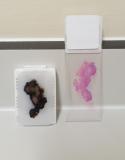Test Directory
SS18 gene rearrangement
Containers - Adult

FFPE block / H&E slide / Pathology report
|
|
Laboratory Site
Old Dalkeith Road
Edinburgh
EH16 4SA
Transport arrangements
Referral specimens should be sent directly to Molecular Pathology at the above address (see transport recommendations). For patients with pathology specimens held within NHS Lothian there is no need to arrange transport of specimens.
How to request
Testing for NHS Lothian patients can be requested by email to molecular.pathology@nhslothian.scot.nhs.uk or by discussion with an NHS Lothian Pathologist. Referral requests may be accompanied by a completed request form or covering letter.
Please also refer to our detailed requesting instructions.
Availability
Monday - Friday. 09:00 – 17:00
Anticipated turnaround
Turnaround times will vary depending on the nature of the report required.
Individual FISH results should be available within 10 working days. See results.
Static information/disclaimer
This test is accredited to ISO 15189.
Please note: alternative methodologies may be used. Full details will be included in all reports.
General additional information
Synovial sarcoma is one of the rarest forms of soft tissue sarcoma. It most frequently arises near the joints of the arms, neck or legs in adolescents and young adults. Most cases are associated with a reciprocal t(x;18)(p11.2;q11.2) translocation between the SS18 gene on chromosome 18 and one of three SSX genes (SSX1, SSX2 and SSX4) on the X chromosome. The resulting fusion protein is thought to contribute to pathogenesis by bringing together the transcriptional activating domain of SS18 and the transcriptional repressor domains of SSX, and incorporating into the SWI/SNF chromatin remodelling complex, blocking its tumour suppressor function.
A positive SS18 gene rearrangement result is considered to be supportive evidence where a pathological diagnosis of synovial sarcoma is being considered.
SS18 gene rearrangements are detected by break-apart fluorescence in-situ hybridisation (FISH) analysis. The method will identify a chromosomal rearrangement involving the SS18 locus at 18q11.2, but not the specific gene fusion partner.
For clinical advice on appropriate investigations, please contact our Molecular Pathology team.